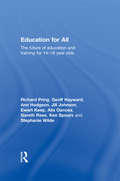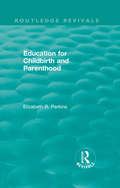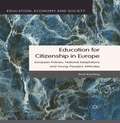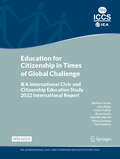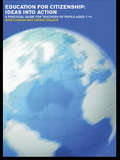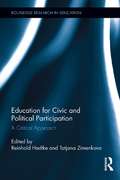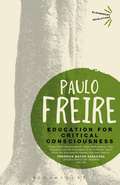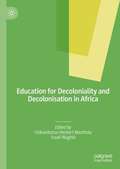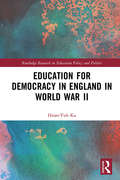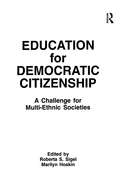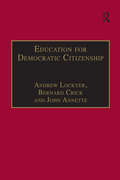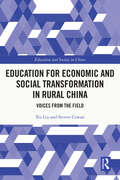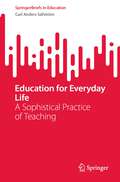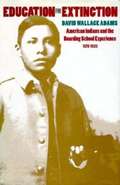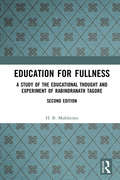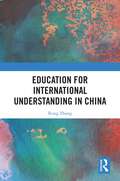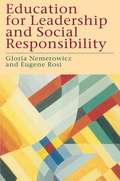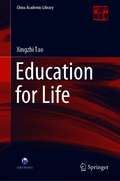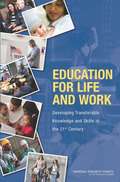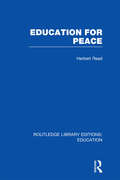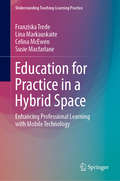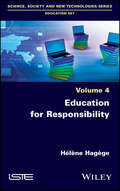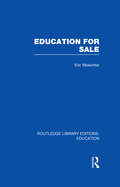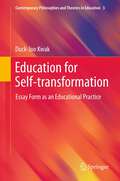- Table View
- List View
Education for All: The Future of Education and Training for 14-19 Year-Olds
by Jill Johnson Richard Pring Gareth Rees Ewart Keep Geoffrey Hayward Ann Hodgson Alis Oancea Ken Spours Stephanie WildeThere are two key questions at the heart of the ongoing debate about education and training for all young people, irrespective of background, ability or attainment: What counts as an educated 19 year old today? Are the models of education we have inherited from the past sufficient to meet the needs of all young people, as well as the social and economic needs of the wider community? Education for All addresses these questions in the light of evidence collected over five years by the Nuffield Review of 14-19 Education and Training: the most rigorous investigation of every aspect of this key educational phase for decades. Written by the co-directors of the Nuffield Review, Education for All provides a critical, comprehensive and thoroughly readable overview of 14-19 education and training and makes suggestions for the kind of education and training that should be provided over the coming decade and beyond. The authors acknowledge that much has been achieved by the respective governments – massive investment in resources; closer collaboration between schools, colleges, training providers, voluntary agencies and employers; recognition and promotion of a wider range of qualifications. They are also optimistic about the good things that are going on in many secondary classrooms – enormous amounts of creativity; courageous efforts to meet problems; a deep concern and caring for many young people otherwise deprived of hope and opportunity. But they argue for a radical reshaping of the future in the light of a broader vision of education – a greater respect for more practical and active learning; a system of assessment which supports rather than impoverishes learning; respect for the professional expertise of the teacher; a more unified system of qualifications ensuring progression into higher education and employment; the creation of strongly collaborative and local learning systems; and a more reflective and participative approach to policy. Education for All should be read by everyone working in – or with an interest in – secondary-level education in England and Wales and beyond.
Education for Childbirth and Parenthood (Routledge Revivals)
by Elizabeth R. PerkinsOriginally published in 1980, the setting of this book is in the practicalities of teaching on labour wards, in antenatal clinics and in child health clinics. In such settings, health education about childbirth and parenthood is often an explicit, and always implicit, task for the health professional. The book results from several years’ research on health service teaching methods and contains detailed studies of teaching in practice, in clinics, in classes and on wards, by midwives, health visitors, physiotherapists, doctors, National Childbirth Trust teachers and the writers of educational pamphlets. A number of transcripts of teaching sessions are presented to illustrate ways in which practitioners can develop more relevant and sensitive teaching strategies. The author shows that realistic goals are essential if the needs of learners, who are also problematically ‘patients’ and ‘clients’, are to be met. The book offers insights into professional problems which voluntary organisations concerned with the health service and with educational work with parents, can use to help both themselves and their clients to make a more intelligent use of the facilities available. A more practical but critical philosophy of antenatal teaching is advocated, enabling all professionals involved to take a fresh look at their courses and clients.
Education for Citizenship in Europe
by Avril KeatingThis book examines the evolving relationship between the nation-state, citizenship and the education of citizens, exploring the impact European integration had on national policies towards educating its citizens and citizenship.
Education for Citizenship in Times of Global Challenge: IEA International Civic and Citizenship Education Study 2022 International Report
by Julian Fraillon John Ainley Wolfram Schulz Tim Friedman Bruno Losito Gabriella Agrusti Valeria DamianiThis open access book investigates the ways in which young people around the world are prepared to undertake their roles as citizens. It presents the international results from the third cycle of the study IEA’s International Civic and Citizenship Education Study (ICCS 2022). Based on data from 24 countries or benchmarking participants from Europe, Latin America, and Asia, ICCS 2022 studies contexts for and learning outcomes of civic and citizenship education in a wide range of national contexts at the beginning of the third decade of the 21st Century. It responds to both enduring and emerging challenges of educating young people in a world where contexts of democracy and civic participation continue to change. The study addresses issues related to young people’s engagement through digital technologies, migration and diversity, perceptions of the political system, global citizenship, and education for sustainable development. Further, it contains data that reflects civic-related aspects of recent developments such as students’ perceptions of restrictions in response to national emergencies and their trust in scientists. Over the past 50 years, the IEA has conducted comparative research studies in a range of domains focusing on educational policies, practices, and outcomes in many countries around the world. Prior to ICCS 2022, the IEA had conducted four international comparative studies of civic and citizenship education, with a first survey implemented in 1971, a second in 1999, a third in 2009 and a fourth in 2016. ICCS 2022 data allows education systems to evaluate the strengths of educational policies, from a comparative perspective, and to measure progress in achieving critical social objectives of their educational policy agendas.
Education for Citizenship: A Practical Guide for Teachers of Pupils Aged 7-14
by Cathie Holden Nick CloughThis clear and user-friendly text provides practical guidance on how to incorporate citizenship into the curriculum. It offers a wealth of teaching aids including: * tried-and-tested photocopiable materials* case studies * suggested teaching strategies* comprehensive reference and resource section. Nick Clough and Cathie Holden are fully experienced in the field having both taught in primary and middle schools and both now specialise in providing citizenship education courses for trainee teachers and practising teachers. This up-to-date book will help engage those teaching (and studying) the new requirement of Education for Citizenship at Key Stages 2 and 3, and along with lively examples of pupils' work and discussions of the changes to the QCA guidelines regarding citizenship, they provide a comprehensive and complete resource. It is also of immense value to curriculum coordinators and to those wishing to know more about the thinking behind education for citizenship.
Education for Civic and Political Participation: A Critical Approach (Routledge Research in Education #92)
by Reinhold Hedtke Tatjana ZimenkovaParticipation as an element of active citizenship in democracies is a key project of international and national educational policy. Institutionalized approaches for compulsory schools provide participatory access to all young European citizens. But does this picture depict the possibilities and practices of participation appropriately? Can this standard approach to participation be translated into action in view of diverse polities, policies, political cultures, institutions and practices of participation? This book explores what prerequisites must be given for a successful implementation of such a comprehensive international project.
Education for Critical Consciousness
by Paulo FreireFamous for his advocacy of 'critical pedagogy', Paulo Freire was Latin America's foremost educationalist, a thinker and writer whose work and ideas continue to exert enormous influence in education throughout the world today. Education for Critical Consciousness is the main statement of Freire's revolutionary method of education. It takes the life situation of the learner as its starting point and the raising of consciousness and the overcoming of obstacles as its goals. For Freire, man's striving for his own humanity requires the changing of structures which dehumanize both the oppressor and the oppressed.
Education for Decoloniality and Decolonisation in Africa
by Yusef Waghid Chikumbutso Herbert ManthaluThis book focuses on understandings of higher education in relation to notions of decoloniality and decolonization in southern Africa. The volume draws on a range of case studies in multiple politico-cultural contexts on the African continent, and examines some of the challenges to be overcome in order to achieve education for decolonization and decoloniality. Acknowledging that patterns of exclusion, inequality and injustice are still prevalent in the African higher education landscape, the editors and contributors proffer bold attempts at democratizing education and examine how to cultivate just, equal and diverse pedagogical relations. Featuring case studies from South Africa, Zambia, Malawi, and Zimbabwe, the authors and editors examine how higher education can be further democratized and transformed along the lines of equality, liberty and recognition of diversity. This hopeful and bold collection will be of interest to scholars of decoloniality and decolonization in higher education, as well as higher education in southern Africa more specifically.
Education for Democracy in England in World War II (Routledge Research in Education Policy and Politics)
by Hsiao-Yuh KuEducation for Democracy in England in World War II examines the educational discourse and involvement in wartime educational reforms of five important figures: Fred Clarke, R. H. Tawney, Shena Simon, H. C. Dent and Ernest Simon. These figures campaigned for educational reforms through their books, publishing articles in newspapers, delivering speeches at schools and conferences and by organizing pressure groups. Going beyond the literature in this key period, the book focuses on exploring the relationship between democratic ideals and reform proposals in each figure’s arguments. Displaying a variety of democratic forums for debates about education beyond parliament, the book re-interprets wartime educational reforms from a different perspective and illustrates the agreements and contradictions in the educational discourse itself.
Education for Democratic Citizenship: A Challenge for Multi-ethnic Societies
by Roberta S. Sigel Marilyn HoskinIt is becoming increasingly clear that members of a host nation as well as newcomers have to learn what it means to live democratically in a multi-ethnic world and to accept diversity without fear or rancor. This volume, a result of a conference sponsored by the Spencer Foundation, asks a question of increasing significance in view of post World War II immigration patterns and the spread of democratic forms of government: "What can educational researchers and practitioners do to prepare our youth for cooperative, constructive living in a democracy?" This book illustrates how six post-industrial nations -- Canada, Germany, Israel, The Netherlands, the United Kingdom, and the United States -- have met or failed to meet this challenge.
Education for Democratic Citizenship: Issues of Theory and Practice (Routledge Research In Education Ser.)
by Bernard CrickThis important volume provides a comprehensive study of the concept of democratic citizenship (including its conditions and pre-requisites), which has an established place in higher education courses in politics, social policy, sociology and social philosophy. The contributing political philosophers and educational theorists collectively provide a critical commentary on the assumptions, principles and presuppositions associated with the idea of education for active democratic citizenship. This book presents an invaluable combination of original essays from established authors and previously published seminal articles specially revised for the volume.
Education for Economic and Social Transformation in Rural China: Voices from the Field (Education and Society in China)
by Xu Liu Steven CowanLiu and Cowan offer a unique in-depth study of educational development and social transformation in rural China. It foregrounds identifiable settings and personalities, engaging readers with the voices and experiences of people who are involved with the education system. This book explores the link between educational transformation and local economic regeneration. The research covers important phases of the educational development programme outlined by the County’s tow five-year education plans. It records a wide range of perspectives on Chinese rural education from stakeholders engaged with the education service. It reveals the contingent and different factors that lie behind the complex pattern of the educational development process. This research also illustrates how education policy is administered and driven forward through the local officers working closely with school leaders. This intriguing look at rural Chinese educational development will interest academics and students specializing in the study of education and international development, Chinese education and society, education policy studies and modern China studies
Education for Everyday Life: A Sophistical Practice of Teaching (SpringerBriefs in Education)
by Carl Anders SäfströmThis book examines the role of teaching within public education. It critiques its function in today's educational policies and theories and establishes an alternative way of understanding teaching. It explores teaching from within a Sophist tradition of educational practice and thought.The first part of the book discusses the vital link between public education and democracy, the shifts in schooling's role in fostering competition and comparisons at the cost of social responsibility and democratisation. It identifies the driving force of those shifts as forces of aggression and destruction, central to a neoliberal ideology. The second part of the book argues for a practice of Sophistical teaching rather than Socratic teaching. It explores in-depth what it could mean to be teaching in an up-to-date sophist tradition of educational thought and practice.The book also includes insights for teaching to counter aggressive forces of nationalism, racism, and late capitalism's violence and the escalating climate crisis. Readers will be able to understand teaching within educational thought and precisely how different teaching forms can contribute to education as democratisation.
Education for Extinction: American Indians and the Boarding School Experience, 1875-1928
by David Wallace Adams(back of book) Winner Caughey Western History Association Book Prize Before and after photos of a Navajo student at the Carlisle School, ca. 1880 and 1883, courtesy of the National Anthropological Archives, Smithsonian Institution "This is, quite simply, a wonderful book. In lively prose, Adams tells the poig(nat) (covered by library sticker) ... linst American Indian chil(dren) (covered by library computer sticker) who sought to use bo(th) transforming Indian ] "3 1463 0066913173 mg. doing, and living. Adams demonstrates convincingly that Native American students were anything but passive recipients of the'curriculum of civilization.'" -Choice "Everything is here: the cropped hair and army uniforms, the endless drilling and marching, the round of daily chores, the spells in the guardhouse for speaking Indian, and the ubiquitous little school graveyards that signaled the terrible toll these institutions took on young lives. Required reading for all students of United States race relations." -London Times Higher Education Supplement "A story worth reading and remembering, one that reveals the use of education as a weapon of war, a method of domination. A strong lesson in the potential for education to become part of a political and cultural arsenal." -American Journal of Education "Persuasive and moving, this book is full of good stories that should appeal to the general public." -Brian Dippie, author of The Vanishing American: White Attitudes and U.S. Indian Policy "An important contribution to the literature of Indian-white relations." -Robert M. Utley, author of The Lance and the Shield: The Life and Times of Sitting Bull "Richly detailed and extremely well written." -Western Historical Quarterly David Adams is associate professor of education at Cleveland State University.
Education for Fullness: A Study of the Educational Thought and Experiment of Rabindranath Tagore
by H. B. MukherjeeThis volume is the first comprehensive exploration of Rabindranath Tagore’s works on education and pedagogy. It presents a valuable account of the creation of Santiniketan and Visva-Bharati, Tagore’s vision of social regeneration, and his rejection of the colonial scheme; while reflecting on significant events of his life and his ideas. The book evaluates Tagore’s unique contribution to education and discusses his views on fundamental issues, such as aim, method, discipline, and medium. It reinforces for readers today the relevance of his experiments and activities in the field of education. Drawing from various sources, the book also offers bibliographic information on Tagore’s writing on education. This new edition with a new Introduction and Foreword will be of immense value to educationists, teachers, policymakers, and those interested in modern Indian history and the philosophy of education.
Education for International Understanding in China
by Rong ZhangIdentifying the essential feature of education for international understanding advocated by the United Nations Educational, Scientific and Cultural Organization (UNESCO), the book explores how Chinese schools have implemented education for international understanding since the 1980s. Through vivid cases, the author introduces the practice of education for international understanding in Chinese primary and middle schools. Based on the questionnaire survey, she analyzes the international understanding competence of Chinese students and teachers. Furthermore, she discusses the current dilemma and proposes possible solutions for Chinese education for international understanding in the future. While providing a window into China's contemporary education for the international community, the book can also be used as a reference for educational policymakers, educational researchers and primary and secondary school teachers in other countries.
Education for Leadership and Social Responsibility
by Gloria Nemerowicz Eugene RosiThe editors of this text contend that there is a lack of leadership in existence for deciding global and national problems. Colleges and universities are generally expected to produce national, political, scientific and corporate leaders. Most institutions maintain that their graduates are leaders, yet few institutions explicitly address the isssue of leadership and social responsibility in a systematic and comprehensive way. Often academic approaches consist of unfocused courses of leadership, looking at leadership styles and managerial decision-making within a business context. Basing their work on research, the editors discuss what they consider to be an important programme for the development of leadership and social responsibility in schools and institutions of higher education.
Education for Life (China Academic Library)
by Xingzhi TaoThis book is an anthology of English writing on education by Tao Xingzhi, the great Chinese educator and thinker. It includes several articles that represent his educational ideas and life philosophy, such as China in Transition, Creative Education, The Little Teacher and the Literacy Movement, and Education for All. These works are not only highly readable, but also present educational philosophies that are closely related to real life, and can be used to highlight and correct the deviations of strongly utilitarian educational concepts in modern society. Further, the appendix includes stories, fables, and poems translated by Tao Xingzhi, as well as his own poems written in Chinese and translated into English. This book offers readers interested in education’s new perspectives and inspiration. It also contributes to a more comprehensive and accurate understanding of Tao Xingzhi as well as his educational theories.
Education for Life and Work: Developing Transferable Knowledge and Skills in the 21st Century
by James W. PellegrinoAmericans have long recognized that investments in public education contribute to the common good, enhancing national prosperity and supporting stable families, neighborhoods, and communities. Education is even more critical today, in the face of economic, environmental, and social challenges. Today's children can meet future challenges if their schooling and informal learning activities prepare them for adult roles as citizens, employees, managers, parents, volunteers, and entrepreneurs. To achieve their full potential as adults, young people need to develop a range of skills and knowledge that facilitate mastery and application of English, mathematics, and other school subjects. At the same time, business and political leaders are increasingly asking schools to develop skills such as problem solving, critical thinking, communication, collaboration, and self-management - often referred to as "21st century skills. " Education for Life and Work: Developing Transferable Knowledge and Skills in the 21st Century describes this important set of key skills that increase deeper learning, college and career readiness, student-centered learning, and higher order thinking. These labels include both cognitive and non-cognitive skills- such as critical thinking, problem solving, collaboration, effective communication, motivation, persistence, and learning to learn. 21st century skills also include creativity, innovation, and ethics that are important to later success and may be developed in formal or informal learning environments. This report also describes how these skills relate to each other and to more traditional academic skills and content in the key disciplines of reading, mathematics, and science. Education for Life and Work: Developing Transferable Knowledge and Skills in the 21st Century summarizes the findings of the research that investigates the importance of such skills to success in education, work, and other areas of adult responsibility and that demonstrates the importance of developing these skills in K-16 education. In this report, features related to learning these skills are identified, which include teacher professional development, curriculum, assessment, after-school and out-of-school programs, and informal learning centers such as exhibits and museums.
Education for Ministry Reading and Reflection Guide VOLUME C Living as Spiritually Mature Christian
by Richard E. BrewerA third of the forth guide series of Reading and Reflection Guides
Education for Peace (Routledge Library Editions: Education #152)
by Herbert ReadThis book deals with the everlasting problem of war and peace. In it, the author argues that mankind must be predisposed for peace by the right kind of education and he discusses how to devise methods of education which will prevent war.
Education for Practice in a Hybrid Space: Enhancing Professional Learning with Mobile Technology (Understanding Teaching-Learning Practice)
by Franziska Trede Lina Markauskaite Celina McEwen Susie MacfarlaneThis book presents a mobile technology capacity building framework that offers academics, students, and practitioners involved in workplace education a deeper understanding of, and practical guidance on, how mobile technology can enhance professional learning. Approaching professional and workplace learning as a hybrid space in which work, learning and technology meet, the book discusses the value of mobile technology in shaping professional education, particularly during student placements.The framework focuses on staying professional and safe, considering issues of time and place, planning learning activities, initiating dialogue, networking, creating learning opportunities on-the-go, and deepening reflection. It is designed to assist students and their educators to use mobile technology knowledgeably and responsibly, and to help bridge the gap between university learning and workplace practice.This book also contributes to a better understanding of the interconnectedness between learning, practice and technology. It demonstrates how to enhance learning and working with mobile technology by drawing on two perspectives: the ‘professional-plus’ and the ‘deliberate professional’.
Education for Responsibility
by Hélène HagègeChanging your mind to change the world is the general principle proposed to educate for responsibility. Using an interdisciplinary scientific approach, this book dissects the functioning of the ego, that is to say the belief in a self, an illusion that causes disharmony. After an original modeling of the notion of responsibility, the author deduces that it is incumbent on all of us to become aware of the relationship between our own minds and the world. Thus, gaining consistency and awareness, everyone would have the potential to free themselves from the illusion of the ego and contribute to a more harmonious world. This book therefore proposes psychospiritual skills, favored in particular by different forms of reflexivity and by meditation (and mindfulness), which can serve as a basis for a curriculum to educate for responsibility. This academic connection between meditation and ethics is a major innovative contribution.
Education for Sale (Routledge Library Editions: Education)
by Eric MidwinterTeachers, schools and education authorities invariably hide their considerable lights and their public relations techniques are often inadequate for broadcasting the invaluable work accomplished in schools. This book offers clear-cut and highly –practical advice for every teacher from pre-school to sixth form on how to get the educational message across to parents. Over the past decades it has become an acute professional concern for teachers to involve parents as closely as possible in the educational process. The book acknowledges that educational salesmanship must be adapted to the cultural norms of its customers and that many teachers, because of their background and training, have reservations about their role as publicists. Set out here is a logical and orderly path of action to help everyone from the most extrovert to the most diffident.
Education for Self-transformation
by Duck-Joo KwakExemplifying what it advocates, this book is an innovative attempt to retrieve the essay form from its degenerate condition in academic writing. Its purpose is to create pedagogical space in which the inner struggle of 'lived experience' can articulate itself in the first person. Working through essays, the modern, 'post-secular' self can guide, understand, and express its own transformation. This is not merely a book about writing methods: it has a sharp existential edge. Beginning by defining key terms such as 'self-transformation', Kwak sketches the contemporary debates between Jürgen Habermas and Charles Taylor on the status of religious language in the public domain, and its relationship to secular language. This allows her to contextualize her book's central questions: how can philosophical practice reduce the experiential rift between knowledge and wisdom? How can the essay form be developed so that it facilitates, as praxis, pedagogical self-transformation? Kwak develops her answers by working through ideas of George Lukács and Stanley Cavell, of Hans Blumenberg and Søren Kierkegaard, whose work is much less familiar in this context than it deserves to be. Kwak's work provides templates for new forms of educational writing, new approaches to teaching educators, and new ways of writing methodology for educational researchers. Yet the importance of her ideas extends far beyond teaching academies to classroom teachers, curriculum developers - and to anyone engaged in the quest to lead a reflective life of one's own.
